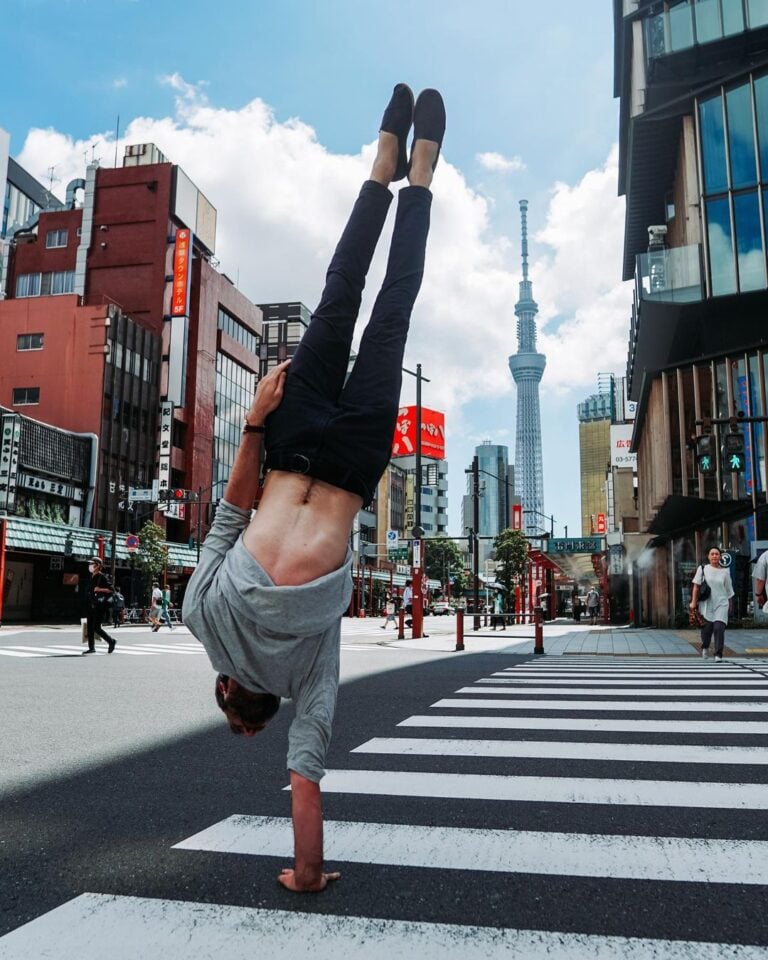
“A friend said to me ‘Why are you looking for a job as an English teacher? You’re a gymnastics coach’. And I took huge offense to that because I thought that with moving to Japan, especially during a pandemic, the only way was to be teaching English. I didn’t speak Japanese at that time, so why would a company take me? But then I applied for gymnastics jobs, and I got them”.
Jonathan was first introduced to gymnastics, as most of us are, during a PE lesson. He was immediately captivated, and began free running and parkour, learning somersaults and acrobatics in the park with his friends. A self-taught gymnast, he learned new techniques the hard way. “It was basically landing on your face many times until you got it right.”.
At 18, he quite literally left home to join the circus. Offered the chance to study juggling, rope work, aerial movement, or acrobatics, he spent one year studying under professional performers, specializing in tumbling and acrobatics.
With his free-running and circus training, Jonathan made a little money doing some performances, but it was his choice of degree that really opened doors for him.
After his year at the circus school, he went to London to study drama. He began performing in commercials for running shoes, music videos, and he even starred in an advert for a Danish internet company. With drama training, his scope for opportunities expanded, as he had become an actor who could perform his own stunts. A particular highlight for him was appearing in the Disney live-action remake of Cinderella.
One of his most lucrative jobs was an advert for Regain, a hair growth company, which he assures me was “actually a super cool advert”.
Alongside his work in film and television, he also found part-time work at dance companies and martial arts schools, teaching acrobatics and gymnastics.
Before relocation to Japan, he established a successful online training course, frequently did freelance work that paid well, and was teaching privately. He ran my own free-running academy in Oxford, and organized an annual international handstand event in Bristol which welcomed both newcomers and veterans from around the globe.
I asked him why, if things were going well in the UK, did he decide to start over again in Japan?
“My wife and I are Christians, and we felt God was calling us to Japan” he told me.

Without any previous designs to move abroad, Jonathan wasn’t sure where to look for jobs, and with a friend in Fukuoka, he focused on job-hunting in Kyushu. He began looking for English teaching jobs, as he believed that was the easiest way to get into Japan. He applied for various positions, had interviews, but things either didn’t quite work out or didn’t feel like a good fit. It was at this point that Jonathan had an experience that would redirect his focus. As he revealed to me, “I had a dream that I was in Tokyo, and it prompted me to search for jobs there instead”.
With this change of direction, he also implemented a change of tactics. Deciding that teaching English in Japan wasn’t really a good fit for him, he began searching on Instagram, sent messages to two gymnastics clubs, and got job offers from both. One of the companies got back to him straight away and set up meetings and interviews, leading to his current employment.
I asked him to share his method for securing an interview through social media, and it turned out to be incredibly simple. He would ask his Japanese friend how to write “taiso” and “Tokyo” in kanji, then search on Google and Instagram. To the very first gymnastics clubs that the search yielded, he, aided by his friend, would send a direct message to their Instagram account. The messages would be as simple as “I’m Jonathan, from England. My wife and I are looking to move to Japan. Do you have any job vacancies? If you look at my Instagram, you can see the kind of stuff that I do. I have experience teaching gymnastics and circus, from basic to high-level”.
Using his social media to secure a job in Japan was an afterthought for Jonathan, but I asked how others might follow the same path. He was in a relatively unique situation, as he had spent years amassing a fairly substantial Instagram following (around 8,000 followers). His (now) boss took a look at his content and was impressed with the content and quality. “If someone is going to use their Instagram account as a way to engage with a company, it has to have a professional look. It can’t just be loads of pictures of your cat” he warns.
Whether this is a route he would recommend to other job-seekers depends on their situation. In his own words, if you are “young” and able to enter Japan on a working holiday visa, he suggests a trip to Japan so you can get a lay of the land and look for potential jobs. During your stay, you should spend some time and energy working on a Japanese CV and cover letter, and get it out there. Start sending it to the companies you would like to work for. “Have a plan, do loads of research, and go to the companies. Just try it. You have nothing to lose”.
However, if your circumstances don’t allow for a few months sortie into the Japanese job market, then you may be encouraged to pursue the same route as Jonathan. Use available online tools (Instagram, Facebook, LinkedIn, a simple Google search) to find companies that interest you. If you have experience in their field, simply send them a message or email and see if you can get a response.
Being a gymnastics coach is not a typical job that foreigners may find themselves in, and it’s hardly the nine-to-five that we’re typically used to. Fortunately, as a non-Japanese he finds he isn’t expected to work the same “intense hours” as his native co-workers. He gets his two days off per week, his hours are set at 13:00 til 20:30, and he only has to attend a meeting once a month (although, these meetings begin at 21:30 on a Friday evening…).

Coming to Japan with his wife and two young children, these irregular work hours has caused a shift in his daily routine. In England, he was able to spend more time with his family, especially the kids. Now, however, he makes a concerted effort to ensure it’s quality time they spend together, when they can. He takes his son to nursery every morning, and is able to spend time with his wife and daughter in the before heading to work. But when he gets home late at night, his family are already asleep. Despite working in Japan for a little over a year, this is something he is still getting to grips with.
Leaving a successful and developing career in the UK, I was curious whether he thought his current wages in Japan were enough to support a family of four. His wife takes care of the baby at home, leaving Jonathan as the only income providor. Unsurprisingly, they find it challenging to survive in Tokyo on his wages alone, and rely on support from their church back in England.
Finally, I asked him for any words of wisdom for those seeking a job other than English teaching.
“I don’t believe we should particularly follow any else’s path, but if you have a strong desire to move to Japan, then test it. Push some doors with emails or messages to different companies and see what happens.”















